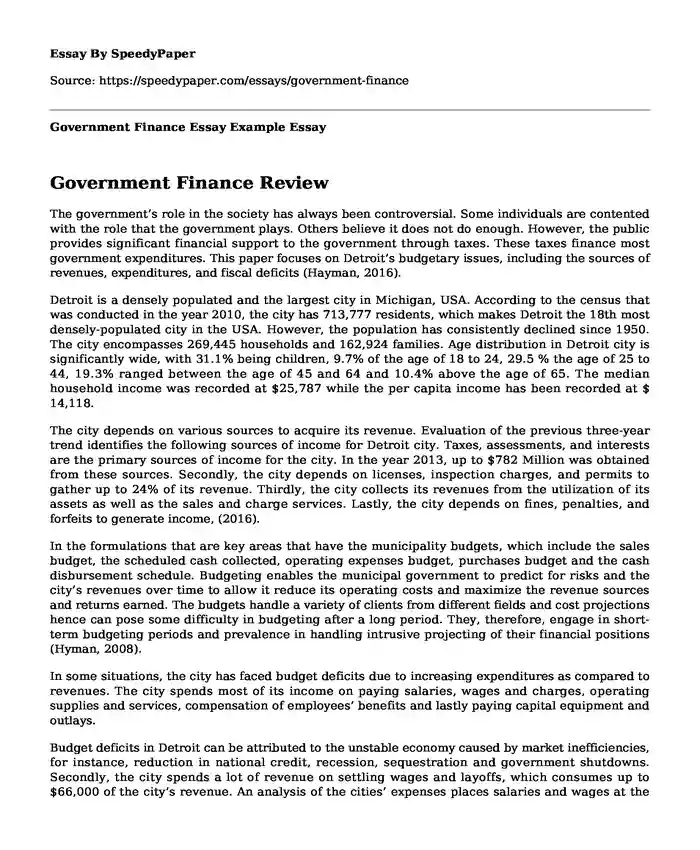
| Type of paper: | Essay |
| Categories: | Finance Government |
| Pages: | 3 |
| Wordcount: | 658 words |
Government Finance Review
The government’s role in the society has always been controversial. Some individuals are contented with the role that the government plays. Others believe it does not do enough. However, the public provides significant financial support to the government through taxes. These taxes finance most government expenditures. This paper focuses on Detroit’s budgetary issues, including the sources of revenues, expenditures, and fiscal deficits (Hayman, 2016).
Detroit is a densely populated and the largest city in Michigan, USA. According to the census that was conducted in the year 2010, the city has 713,777 residents, which makes Detroit the 18th most densely-populated city in the USA. However, the population has consistently declined since 1950. The city encompasses 269,445 households and 162,924 families. Age distribution in Detroit city is significantly wide, with 31.1% being children, 9.7% of the age of 18 to 24, 29.5 % the age of 25 to 44, 19.3% ranged between the age of 45 and 64 and 10.4% above the age of 65. The median household income was recorded at $25,787 while the per capita income has been recorded at $ 14,118.
The city depends on various sources to acquire its revenue. Evaluation of the previous three-year trend identifies the following sources of income for Detroit city. Taxes, assessments, and interests are the primary sources of income for the city. In the year 2013, up to $782 Million was obtained from these sources. Secondly, the city depends on licenses, inspection charges, and permits to gather up to 24% of its revenue. Thirdly, the city collects its revenues from the utilization of its assets as well as the sales and charge services. Lastly, the city depends on fines, penalties, and forfeits to generate income, (2016).
In the formulations that are key areas that have the municipality budgets, which include the sales budget, the scheduled cash collected, operating expenses budget, purchases budget and the cash disbursement schedule. Budgeting enables the municipal government to predict for risks and the city’s revenues over time to allow it reduce its operating costs and maximize the revenue sources and returns earned. The budgets handle a variety of clients from different fields and cost projections hence can pose some difficulty in budgeting after a long period. They, therefore, engage in short-term budgeting periods and prevalence in handling intrusive projecting of their financial positions (Hyman, 2008).
In some situations, the city has faced budget deficits due to increasing expenditures as compared to revenues. The city spends most of its income on paying salaries, wages and charges, operating supplies and services, compensation of employees’ benefits and lastly paying capital equipment and outlays.
Budget deficits in Detroit can be attributed to the unstable economy caused by market inefficiencies, for instance, reduction in national credit, recession, sequestration and government shutdowns. Secondly, the city spends a lot of revenue on settling wages and layoffs, which consumes up to $66,000 of the city’s revenue. An analysis of the cities’ expenses places salaries and wages at the highest expense, which was 27.5 % of the total spending in 2010. On the other hand, employees’ benefits were recorded at $361.7, which was 22.6% of the total expenditures, (Hayman, 2014).
The municipality can opt to revenue alternatives to prevent budget deficits. First, the city can acquire more funds from the national government. Secondly, the state government can opt for local investment and tradeoff to enhance its revenue sources. Lastly, the city can obtain more funds from external donors and creditors with guidelines that regulate its dependence on external sources, (Hyman, 2014).
References
(2016). EBS fund summary. Retrieved 9 September 2016, from http://www.detroitmi.gov/portals/0/docs/budgetdept/2010-11_budget/executive%20budget%20summary%2011/ebs_2010-11_section%20b_summary%20all%20funds_stamped.pdf
David N. Hyman. (2016). Public finance: A contemporary application of the theory of policy. Retrieved 9 September 2016, from http://nurjatiwidodo.lecture.ub.ac.id/files/2012/09/Public_Finance-David-N-Hyman.pdf
Hyman, D. (2008) Health Insurance: Market Failure or Government Failure?. SSRN Electronic Journal. http://dx.doi.org/10.2139/ssrn.1087830
Hyman, D. N. (2014). Public finance: A contemporary application of theory to policy. (11th ed.). Stamford, CT: Cengage Learning
Cite this page
Government Finance Essay Example. (2017, Oct 06). Retrieved from https://speedypaper.com/essays/government-finance
Request Removal
If you are the original author of this essay and no longer wish to have it published on the SpeedyPaper website, please click below to request its removal:
- The Glory of God - Free Essay Sample in Religion
- Personal Essay Example: A Trip to Forget
- Reflection Essay Example on the Soul Talk Book
- Free Paper Example with a Personal Leadership Assignment
- Essay Example on Aristotle Biography
- Essay Example on Women on Boards: Does Diversity Guarantee Better Performance?
- Essay Sample on The Absence of Race in Technological History Studies
Popular categories




